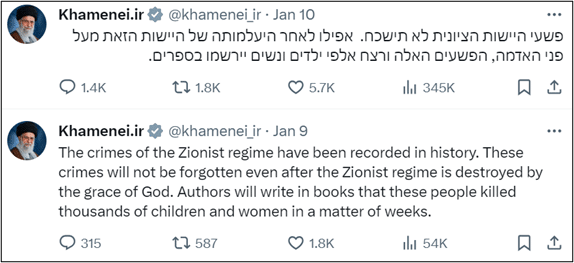Overview
- The International Court of Justice (ICJ) started hearing the case brought by South Africa alleging that Israel is guilty of the crime of Genocide. Many Western countries rejected the case while some Arab and African countries supported South Africa’s actions.
- Israel has announced that it would be transitioning into the next stages of the war in Gaza, with less intense fighting expected in the North and decreasing the forces down by a few brigades. The primary operations in Gaza are targeting the central Hamas battalions and against the Hamas stronghold in Khan Younis. In northern Gaza, IDF troops are guarding their held territory and are focusing on clearing the area and fighting small pockets of resistance.
- Reportedly, Israel informed Egypt of its intention to take control of the Philadelphi Route that divides Gaza and Egypt after months of coordination and counter-offers by the Egyptian side.
- The city of Khan Younis, a major Hamas nerve center and where the Hamas leadership is suspected to be seeking hiding, is expected to take a long time to clear in a dense urban setting and given the vast network of underground tunnels that Hamas built for over a decade.
- The IDF killed a top Hezbollah commander of the Radwan commando force which triggered a response from Hezbollah.
- Diplomats from France, Germany the US and other countries are visiting Lebanon in order to try and alleviate the escalating situation there, and find a diplomatic solution to avoid a larger war between Israel and Hezbollah. Hezbollah continues to make unrealistic demands including territorial demands from Israel and said it will not stop fighting until the Israeli ground invasion in Gaza stops.
- In the first operation of its kind, a joint UK-US operation attacked dozens of Houthis targets. The Houthis pledged to retaliate. The damage inflicted upon the Houthis was very modest and each side is testing the response of the other.
- In Judea and Samaria, a group of heavily-armed Palestinian terrorists tried to infiltrate to a Jewish community in Adora and carry out a massacre but were eliminated by Adora’s local Rapid Response Squad and security forces.
- Iran captured an oil tanker in the Gulf of Oman linked to sanctions that the US has placed on Iran. The US expressed that this action will not go unanswered.
International
- The ICJ started hearing the case brought by South Africa alleging that Israel is guilty of the crime of Genocide. The prosecution of this crime through the ICJ requires the demonstration of intentional and systematic killings and the act of genocide itself. South Africa presented its evidence of intent by quoting junior members of the Knesset or government Ministers that are not part of the War cabinet and do not have any authority over the war. Other “evidence” included statements made by celebrities or lyrics of songs from videos made by IDF soldiers. Some of the judges reprimanded the plaintiff for even bringing the case, as many of the arguments were clearly political and had no legal basis.
- Prior to submitting the case, a Hamas delegation visited South Africa and met with members of parliament there as well as other senior officials. Joint petrochemical venture and warming trade and diplomatic relations with Iran indicate South Africa is increasingly becoming part of the Russian-Chinese-Iranian axis. This includes a 14% increase in trade with BRICS countries between 2022-2023, most notably a 23.52% increase in trade with South Africa. In the aftermath of October 7, South Africa harshly criticized Israel while siding with Iran and Hamas, and the country’s foreign minister made a phone call to Hamas’ senior official Ismail Haniyyeh and to her Iranian counterpart.
- South Africa has long been an active supporter of the Palestinians national movement, with Mandella seen as a hero by many developing countries as a symbol of liberation from colonialism. The South Africans have created a parallel between their struggle for liberation from apartheid and the Palestinian cause, with many instances of public equivalences. South Africa is trying to lead the BRICS block of countries, by trying to underscore itself as a power that stands up against the West, especially with the recent weakening of one of the pillars of the block, Russia, by acting as the agent of the Palestinians at the Hague.
- It increasingly seems that the trial is nothing more than a political show intended to be part of the efforts to isolate Israel while waging of war of public opinion in the West and around the world. South Africa cynically uses its supposed moral power as the country that was subjected to an apartheid regime imposed upon it by colonialists, to engage Israel in lawfare, leveraging the currency of victimhood, that is effective with many progressive Western audiences. Israel responded the next day with its refutations of what it claimed were South Africa “blood libels.”
- Israel made its case the next day detailing the absurdity of blaming a nation that has survived a genocide and is trying to stop a second genocide, as ones who are committing the crime of genocide. Israel accused South Africa of weaponizing the definition of “genocide” and is playing the role of the devil’s advocate in this case.
- Germany announced that it would intervene as a third party before the ICJ in support of Israel under an article allowing states to seek clarification on the use of a multilateral convention. Government spokesman Steffen Hebestreit said in a statement that Israel was “defending itself” after the “inhuman” attacks by Hamas on October 7. Germany rejects the allegations that Israel is committing a genocide and said that because of its history it feels it had a special duty to intervene on Israel’s behalf.
- The United Stated strongly condemned South Africa’s move at the ICJ. White House National Security Council spokesperson John Kirby said, “we find this submission meritless, counterproductive, and completely without any basis in fact whatsoever.” US Secretary of State Anthony Blinken added that the accusations of genocide are outrageous given the fact that Hamas publicly calls for a genocide against Israel.
- Jordan and Turkey announced that they support South Africa’s case. Jordan’s foreign minister has said that Israel is committing war crimes against the Palestinians, and it is the catalyst for the recent rise in tensions in the region including the violence in the Red Sea. Ayman Safady, the Jordanian Foreign Minister has said that Jordan is willing to produce documents and appear in court alongside South Africa if the case continues. Safadi accused Israel of instigating the region into a larger conflict by its aggression which would undoubtedly open new fronts, and that the Israeli actions against Gaza civilians are sufficient to have cross the threshold of the legal definition of genocide.
- Overall, the international response to the case seems to be regionally divided: support for the case by Arab and African countries and rejection of the case by the Western world. The US and Germany are the staunchest supporters of Israel publicly in this case. The UK’s David Cameroon has said the UK is does not agree with what South Africa is doing. The EU declined to comment on the case.
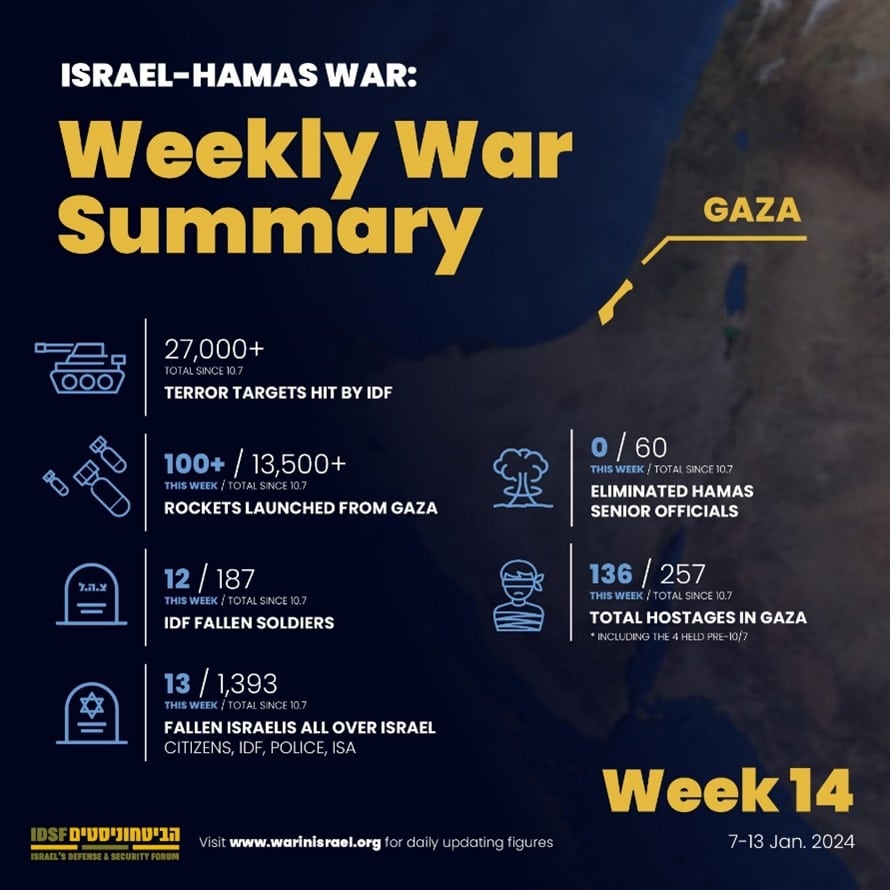
Gaza Strip
Diplomatic
- US Secretary of State Anthony Blinken landed in Israel this week and urged Israel to avoid civilian casualties. In a move that seemed to originate in mounting American pressure, Minister of Defense Yoav Gallant alongside Chief of Staff Herzi Halevi announced that the next stage of the fighting would begin in the coming weeks. Stage two includes limited military raids and the tapering off of the intense military maneuvers in the North. The major challenge the IDF will face in the coming weeks is dealing with the Rafah Brigades as Rafah is home to more than one million civilians. As a result, it is likely that the IDF will direct civilians to return to Northern Gaza in order to clear the battlefield to better target the last 3 Hamas battalions in the Rafah Governate. This is essential as various government officials including the Prime Minster reiterated the need to control the Philadelphi Route (which travels through Rafah) to prevent smuggling of arms through the tunnels under the border with Egypt. In so doing, the IDF would have to consider that in case civilians return to the North, some of the fighting will escalate as Hamas operatives will utilize the weapons depots that have not been cleared in the North, and use them against IDF troops.
- For the first time since the beginning of the war there are negotiations via Qatar to bring medical supplies to the hostages. According to estimates, over a third of the hostages require regular medicinal treatment.
- In a public statement, Israeli Prime Minister Benjamin Netanyahu expressed that Israel has no intention of conquering Gaza or expelling its population. He reiterated the distinctions between the Hamas terrorists that Israel is fighting and the civilians that Israel is doing all it can to protect and minimize collateral damage. This statement was made after Blinken landed in Israel and made clear that the US rejects any proposal to resettle Gaza civilians in other places.
- Israeli officials have informed Egypt that they are planning a military operation along the Philadelphi Route. A few days ago, Egypt rejected an Israeli proposal that would have involved the stationing of Israeli security personnel on the Egyptian side of the border for joint patrols with Egypt, asserting that it would breach Egyptian sovereignty. Egypt said it would bolster physical barriers on its side of the border and plan to install more watchtowers and surveillance cameras, but it will not share surveillance feeds with Israel. Egypt says its military and intelligence services maintain tight control over the border area. Using diplomatic and security channels, Egypt is countering Israel’s plan to control the Philadelphi Route.
- An Egyptian source told a news outlet that the Egyptian army has already started carrying out new security measures “including conducting security patrols along the border by special operations forces to ensure that there are no activities that threaten security in that area.” According to the source, Egypt plans to coordinate on the issue with Hamas and various other terror groups in Gaza and has obtained “assurances that the Philadelphi Route area should be free of any resistance actions, to prevent any Israeli attempt to establish a presence in that region.”
- Secretary Blinken met with PA President Abbas who said that the Palestinians will not accept any attempt to displace them from their land and that Gaza will be part of any future Palestinian State.
- The Saudi ambassador to the UK has publicly said for the first time that Saudi Arabia still intends to normalize relations with Israel, but this would have to be with the condition of establishing a Palestinian State and could not be on the backs of the Palestinian people. He mentioned that a deal was close, but have been discontinued since the October 7th
- In Aqaba, Jordan, a summit was held with PA President Abbas, King Abdullah II of Jordan and Egyptian President Abdel Fattah El-Sisi. In a joint statement released, the three emphasized their opposition to any plan that would include displacing Palestinians from Gaza or Judea and Samaria. They reiterated their refusal to disregard the Palestinian issue and to create an artificial separation between Gaza and Judea and Samaria. They pressed the international community to end the war and increase humanitarian assistance to Gaza. They agreed to work with other Arab countries to implement the Two-state solution and warned of “settler violence” in Judea and Samaria and in the Holy sites in Jerusalem.
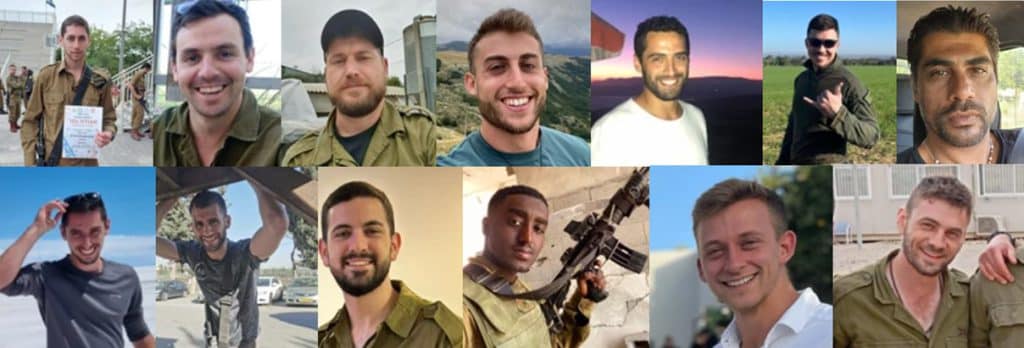
13 IDF soldiers fell in the past week in combat in Gaza and as a result of a Hezbollah missile from Lebanon
Operational
- The city of Khan Younis, a major Hamas nerve center and where the Hamas leadership is suspected to be seeking hiding, is expected to take a long time to clear in a dense urban setting and given the vast network of underground tunnels that Hamas built for over a decade. The IDF has found over 1500 tunnel openings since the beginning of the war and identifies new ones every day in the North. The phase of destroying these tunnels will likely take months to carry out. Just, this week there were massive activities in Khan Yonis with more than 100 tunnel paths identified and mapped out and another 300 tunnel shafts destroyed.
- IDF spokesperson Hagari mentioned that since the beginning of the war Israel has killed 9000 Hamas fighters, and it has no intentions to displace Gazan from Gaza. Civilians would be permitted to return to the North once conditions for their return are met.
- According to the IDF, 8,000 of the 14,000 Hamas terrorists in the North have been eliminated, meaning that there is still more work in the North despite IDF control there.
- The IDF published that since the beginning of the war over 700 rocket launchers were found and destroyed. Some of the rockets had a range of hundreds of kilometers and most of them were found in civilian areas like mosques, apartments, schools and children’s playgrounds.
- The IDF controls Northern Gaza, where it has already moved into “stage 2” of limited raids and clearing operations of weapon storages, tunnels, and pockets of resistance of disbanded terrorists. Terrorists in Jabalia and Shieck Radwan, areas that are militarily controlled by the IDF, are reported to have carried attacks against IDF troops. This is the first report of this kind in a few days indicating that although the area still needs to be completely “cleared,” the low frequency of the attacks demonstrates the disintegration of the Hamas command structure. Most of the fighting carried out by the terrorists are “shoot and run attacks” that include sniper fire, using hidden IEDs and anti-tank missiles.
- The main offensive focused on parts of central Gaza and Khan Younis, in the towns surrounding Dir El Balah and the Khan Younis area with military maneuvers in towns east of it.
- Hamas’ Bureij Battalion in central Gaza is surrounded by the IDF, which is carrying the fight into the Nusirat refugee camp. The Al Marazi camp has also been attacked, and the IDF has already conquered half of it.
- IDF Reserve Brigade 5 completed capturing and clearing the town of Khuza’a as part of operation “Nir and Oz” (named after the massacres in the Nir Oz and surrounding communities). During the operation, IDF troops found textbooks teaching children how to make weapons and launch rockets and other incitement materials. More than 40 tunnel openings were uncovered. The capture of this town is important strategically as it is centrally located to allow for the movement of troops to the north to attack Abasan al-Kabira, and to the west, to disconnect the Salih al Din road which connect Rafah with Khan Younis.
- Bureij Camp is completely surrounded, and it is estimated to be a matter of days before it falls.
- The IDF is exercising a pincer movement around Khan Younis and has almost completely surrounded it.
- The IDF has released details about the Hamas tunnels it has studied before destroying them. The IDF estimates the cost to build the tunnels as dozens of millions of dollars and that they were built using 6000 tons of concrete and 1800 tons of metals. Some tunnels are used as command centers while others are used as sites for launching rockets or holding hostages.
- The IDF has released videos from tunnels in Khan Younis where hostages were held. The IDF uncovered more than 300 tunnel openings in Khan Younis and dozens of tunnels.
- The IDF Chief of Staff made statements about the complexity of fighting in the crowded urban areas of Khan Younis with tunnels underneath the troops and with terrorist forces embedded within the civilian population. The IDF trained for such fighting though not in such high intensity, but after this Gaza experience, the IDF is capable of dismantling any place in Lebanon.
- In a reported incident that received a lot of media coverage, two “journalists” were killed by an IDF drone in Rafah. IDF troops found documentation that prove they were senior PIJ operatives, with one of them responsible for intelligence collection along the border using drones under the guise of journalistic activity. This is yet another attempt by Hamas and the Gaza terror groups to win hearts and minds in the international community and falsely present their terrorist activity under the guise of civil losses or widely-accepted consensus such as targeting journalists. Hamas’ stats on UNRWA staff, journalists, children, and civilians who died in Gaza also fall under that category.
- Hamas Political Bureau Chief, Ismail Haniya gave a speech where he claimed that Israel did not achieve any of its stated war aims and will not be able to achieve them in the future. He laid out the reasons for starting the war:
- The pushing out of the Palestinian cause from the global political discourse.
- The emergence of a radical Zionist government that aims to displace the Palestinians people and “occupy” Al Aqsa.
- The normalization processes between Israel and Arab countries in place of the Palestinians and their cause.
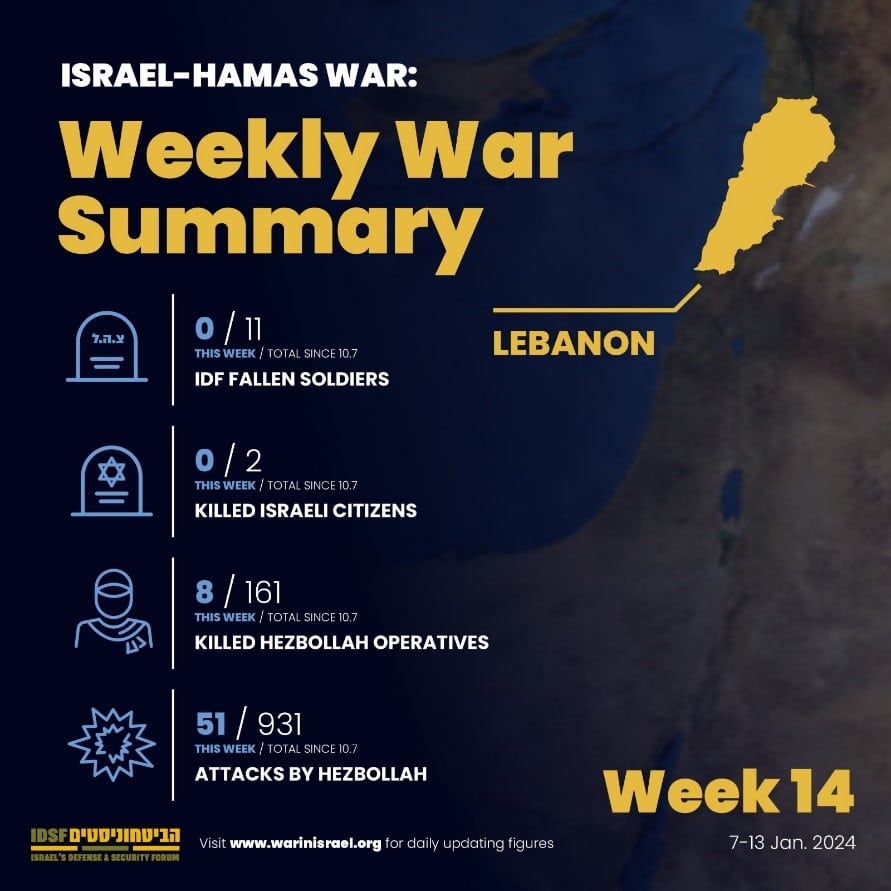
Lebanon
- Hezbollah shot missiles at an IDF base on Mt. Meron targeting sensitive intelligence equipment as a response to the Israeli killing of Saleh Al Arorui. Hezbollah official Hashem Safi Aladeen mentioned that it is important to send a message to Israel, so it won’t be mistaken to think the Hezbollah is weak. Hezbollah ramped up its attacks as a response to the Al Arouri killing and attacked an IDF air force base, which damaged an air control detection unit.
- This week Israel continued to hit Hezbollah hard by eliminating top Radwan Force (Hezbollah’s elite commando force) official Wissam al-Tawil, known as Jawad, in southern Lebanon. Tawil used to be a close associate with Hezbollah Secretary General Nasrallah.
- Hezbollah responded with rocket fire multiple times on Monday which wounded a soldier in the Mount Dov area. A day later Hezbollah struck the IDF Northern Command base in Safed on Tuesday with suicide drones.
- Later in the week IAF fighter planes attacked areas adjacent to villages in southern Lebanon destroying terrorist sites used by Hezbollah. IDF troops identified 4 terrorists in the Har Dov area that penetrated Israeli territory and killed them. During the fight the IDF shot artillery barrages on terrorist squadrons.
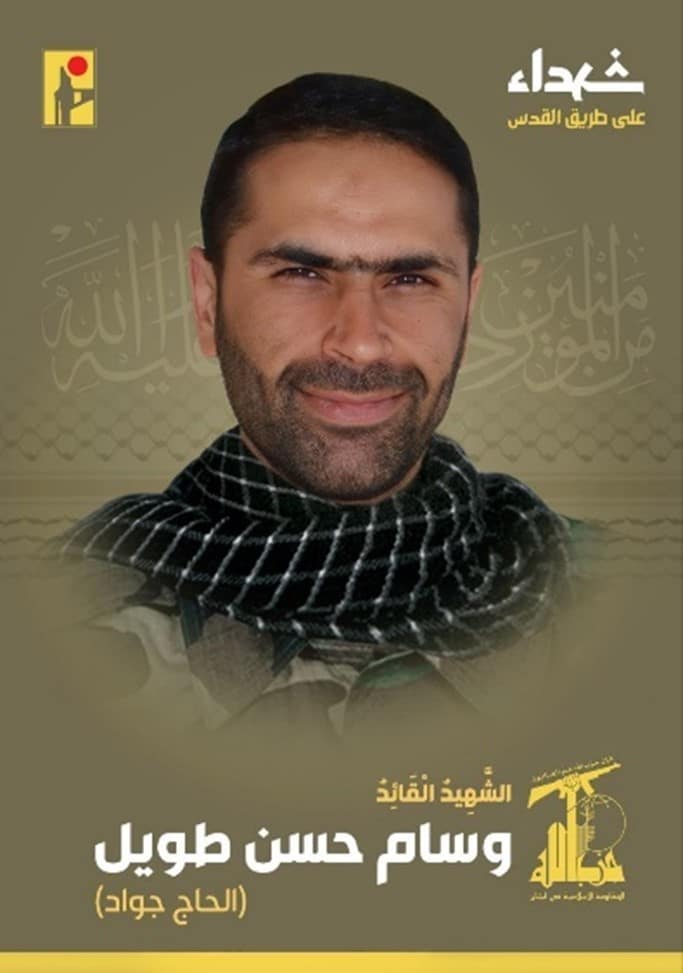
Diplomatic
- The US special envoy to Lebanon, Amos Hochstein, who negotiated the maritime border agreement between Israel and Lebanon in October 2022, is back in Lebanon in an attempt to negotiate a ceasefire between Israel and Hezbollah. When Hochstein landed Hezbollah ‘greeted him’, by attacking Israel 5 times on the same day. Hezbollah said it is not willing to negotiate any ceasefire before the ground operation in Gaza stops and has made demands for border changes in any future negotiations. Hezbollah reiterated its long-time territorial demands from Israel including Mount Dov, the village of Ghajar, the Sheba Farms, the 11 villages, and a larger portion of Israel’s maritime territory.
- The Lebanese Prime Minister met with the German foreign minister, Annalena Baerbock, and discussed the situation in south Lebanon and Gaza. The Prime Minister emphasized that Lebanon respects international decisions and called to support the Lebanese Army to allow it to exercise its duties. Baerbock expressed her position on the importance of implementing UN Resolution 1701 which requires the demilitarization south of Litani River in South Lebanon.
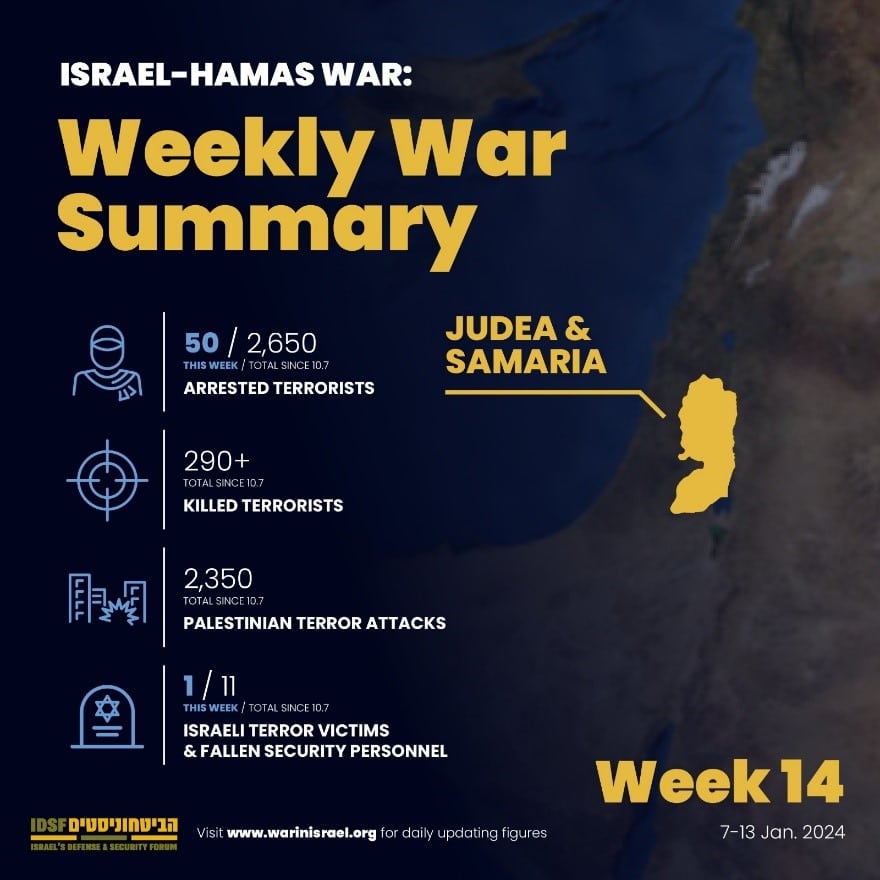
Judea and Samaria
- Since the beginning of the war, the IDF has detained 2650 terror operatives, 1300 of which are affiliated with Hamas.
- Hamas continues to incite more terrorists to attack Jews living in Judea and Samaria as part of its strategy to open another front against Israel. The IDF continued its operations to destroy terrorists’ infrastructure this week. There were a few terrorists attacks this week, but overall, it was not as intensive as previous weeks of fighting.
- There were several Palestinian rallies throughout Judea and Samaria supporting South Africa’s ICJ case against Israel. Most notably, a rally that was organized in the Nelson Mandella square in Ramallah in which Palestinian Authority Prime Minister, Mohammad Ashteyah, accused Israel of committing genocide, and thanked South Africa for standing with the Palestinian people.
- An East Jerusalemite Palestinian Arab has been murdered by Palestinian terrorists who took him for a Jew (his license plate indicated that he was an Israeli citizen). The terrorists were a doctor and a nurse.
- The IDF arrested 2 operatives who tried to smuggle 49 guns and M 16 rifles from Jordan. This may be part of an Iranian network of weapons smuggling, and remains under investigation.
- In the Israeli community of Adora, northwest of Hebron 3 terrorists infiltrated the community and attempted to commit a massacre. They managed to wound a soldier protecting the community and the 3 were later eliminated by the community’s security forces.
- Hamas called for massive public demonstrations under the slogan “victory to proud Gaza and support of our brave resistance” using the term “flood” designating the name of the operation “Al Aqsa Flood” in various publications.
- IDF and other security forces continued their operation to destroy terrorists’ infrastructure in the Nur a Shams village and uncovered dozens of hidden IEDs and arrested terrorist operatives.
- Shin Bet with the Israeli police thwarted a terrorist plot that two ISIS affiliated terrorists planned in East Jerusalem. They planned to use explosives against security forces. The 21- and 23-year-old suspects were arrested and an indictment against them was issued.
- The IDF killed one of the Brigade commanders of the Al Quds Brigades, a PIJ group.
- The IDF uncovered more than 80 IEDs that had been hidden by terrorists in Jenin. The IDF also found 100 IEDs in Tarqumiyah near Hebron.
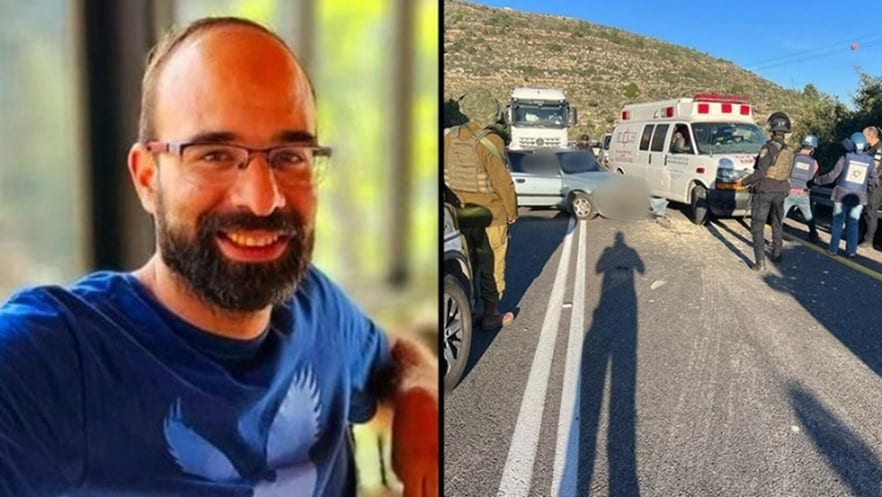
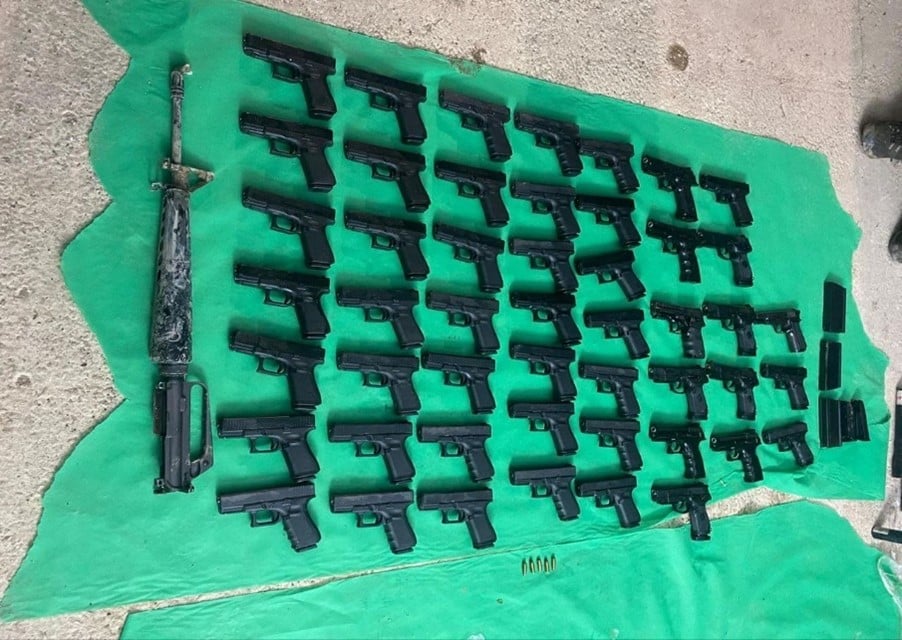
Iraq and Syria
- Al Sudani, the Iraqi Prime Minister is succumbing to pressure form Pro-Iranian militias, and has called on the US to leave the country. This move would destabilize Iraq and let radical Sunni and Shia militias to take a stronger hold over the country. It seems that Al Sudani has been making their statements to appease the radical factions in his country despite the knowledge of what an American departure would entail for Iraq.
- A truck with weapons crossing the Iraqi Syrian border was attacked.
- The Jordanian air force carried out 4 attacks on Syrian territory, the second such raid within a week against suspected farms and hideouts of Iran-linked drug smugglers.
- The militias in Syria and Iraq have ramped up their attacks against American military bases. After a series of counter attacks. the IRGC ordered its troops to evacuate the area.
- The Iraqi Shia militias claim that they shot at the Golan and Eilat but no publication other than their own confirmed it. It appears to be following up with another publication from a few days prior regarding a shooting on the Port of Haifa, which similarly, was not confirmed.
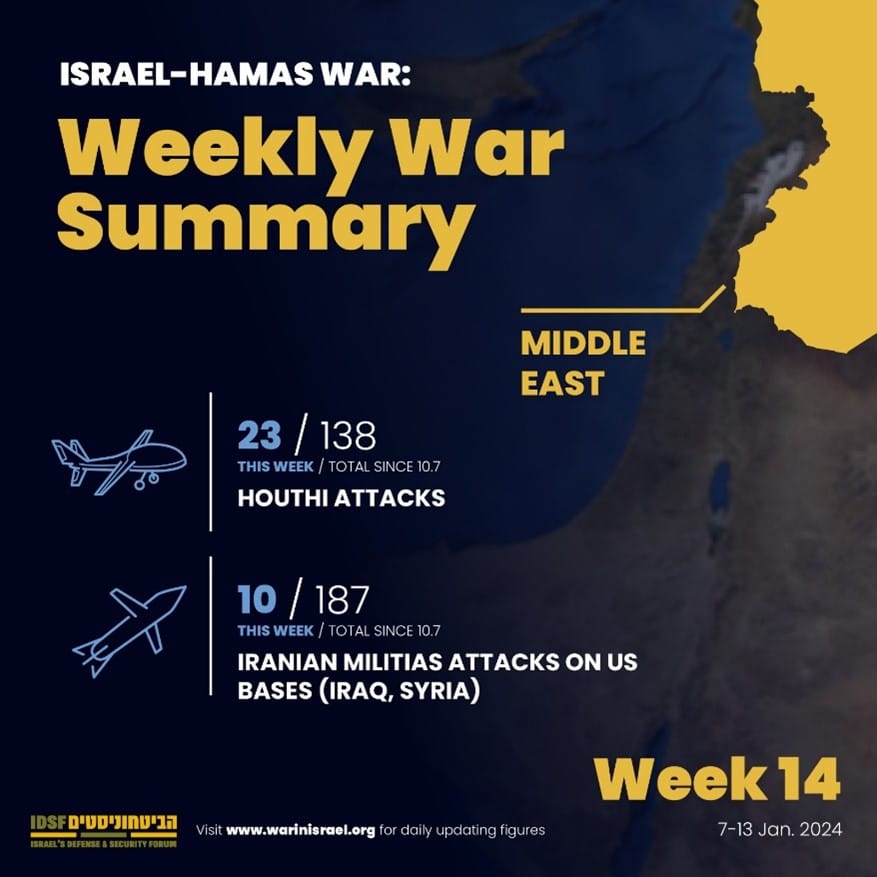
Yemen
- The main event of the week were the two joint UK-US airstrikes as part of a coalition against Houthi targets in mainland Yemen. This type to retaliation against the Houthis is unprecedented and is the first time since the war against ISIS that a joint Western and Middle Eastern alliance carried out attacks on Middle East soil. The attacks included some 60 targets on 16 Houthi sites including weapons storage, logistical hubs, and air defense systems. Biden stated that he would “not hesitate to direct further measures to protect our people and the free flow of international commerce.” The Houthi leader said that the Houthis will response to the American “aggression” will not be disproportionate to the American operation.
- The joint attack also included Bahrain the only Arab nation to participate in the strike alongside other Western allies. The attack did not damage the Houthis’ capabilities in any major way, and they were calculated to be a symbolic gesture to create deterrence and to act on previous threats made against the Houthis. According to certain reports, many of the targets were “empty” as the US no longer employs active intelligence operations in Yemen. This also explains the very low number of casualties.
- The Houthis retaliated to the joint operation with a barrage of ground-to-ground ballistic missiles and attacks against other British and American ships in the Red Sea. There was an apparent hit to one of the vessels of the coalition.
- Strategically speaking, the war with the Houthis is asymmetric. The Houthis have the advantage of weakening their opponents through their own country’s public opinion towards the nations’ involvement in the Middle East. The Houthis and Iran know that the US is in an election year, and it is incredibly unpopular and accepted on a bipartisan level to avoid entering into a new war in the Middle East that might draw the US to be more entangled in the region. This has led the Americans to take a very measured approach which allows the Houthis to afford a larger escalation as long as they know that public pressure on Biden and other Western leaders exists at home.
- The UK has released government statements about the attack framing their involvement as a necessity to protect global commerce. Labor Leader Kier Starmer has echoed statements backing strikes against the Houthis.
- The UN Security Council on Wednesday passed a resolution 2722 condemning “in the strongest terms” the multiple attacks by Houthi rebels off the coast of Yemen which have disrupted global trade and raised fears of further spillover from the war in Gaza.
- The Houthis spokesperson said that the 31 ships that they attacked were all related to Israel. He also said that the US and the UK attacked 73 targets in north Yemen. 5 terrorists were killed and 6 were wounded.
- On Friday, a land-sea missile hit a Russian oil tanker in the Port of Aden.
- An IRGC commander has said that more attacks like the one carried out by the American led coalition would lead to further escalation at sea.
- Earlier this week, the Houthis announced that they shot missiles and UAVs towards an American ship. The Houthis said it was in response to the killing of Yemeni naval soldiers in the past week. The UK and the US collaborated and shot down 18 suicide UAVs and 2 cruise missiles that were shot towards international navigation routes in the Red Sea. One of the missiles missed and hit the water with no casualties in the incident.
- It was reported that the attack was leaked to the British press that reported on it minutes before it took place.
- Although the Houthis are aiming to connect the Gaza front with their actions, American and UK military leaders like Gen. Pat Ryder, the Pentagon Spokesperson, made sure to establish clear separation between the Gaza war and the US strikes against the Houthis which are meant to stop the threat on global navigation routes.
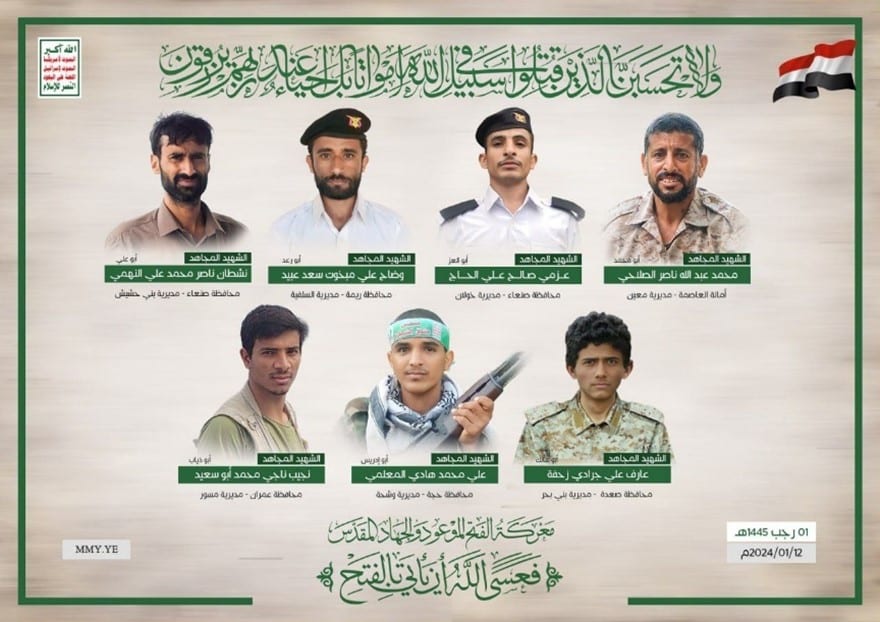
Iran
- Iran captured an oil tanker linked to US sanctions enforcement in the Gulf of Oman, one of the most brazen direct involvements of Iran in the conflict, as it was not executed through one of its proxy groups.
- Iran is currently holding 5 ships and more than 90 hostages.
- Iranian Leader Ali Khamenei posted on X in Hebrew that the State of Israel should be annihilated. IRGC Commander Hossein Salami reiterated that message. This comes in direct line with long-standing Iranian strategy of bringing an end to Israel, striving to obtain nuclear weapons and constructing an array of “octopus tentacles”, proxies around the Middle East as well as vast networks of operatives around Europe, the United States, Africa, South American and Southeast Asia.
